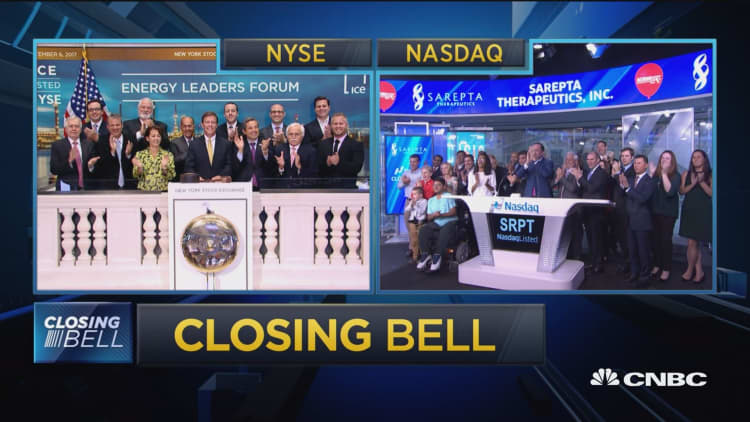
U.S. stocks rose on Wednesday after two top Democratic leaders said President Donald Trump would support a debt ceiling extension and government funding plan.
The Dow Jones industrial average rose 54.33 points to close at 21,807.64, with Home Depot and Chevron contributing the most to the gains. Wednesday's gains follow the Dow's biggest one-day drop since August 17.
The S&P 500 climbed 0.31 percent to close at 2,465.54, with energy and consumer discretionary among the best performers. However, shares of United Continental Holdings and Newell Brands were among the worst performers in the S&P 500.
United cut its unit revenue and pre-tax margin guidance for this quarter, citing Hurricane Harvey. Newell Brands, meanwhile, issued a statement saying "nearly all" of its resin suppliers in Louisiana and Texas are shut down because of Harvey.
The Nasdaq composite rose 0.28 percent to settle at 6,393.31 as some large-cap tech stocks, like Facebook and Netflix, regained their footing.
Vacation and timeshare stocks also fell Wednesday while investors kept an eye on Category 5 Hurricane Irma. Shares of Hilton Grand Vacations were down 1.44 percent, while shares of Marriott also fell around 1 percent.
Major U.S. Indexes
Trump will support Senate Minority Leader Chuck Schumer and House Minority Leader Nancy Pelosi's plan to combine raising the debt ceiling with aid for Hurricane Harvey, the two Democrats said.
Both Pelosi and Schumer had indicated their intention to tie the two together in a joint statement released earlier.
Dave Lutz, head of ETF trading at JonesTrading, pointed out that the yield in the one-month Treasury bill pulled back sharply after the Schumer-Pelosi statement was released. He added the move shows investors now see a higher possibility of a deal being struck on the debt ceiling.
However, House Speaker Paul Ryan, a Republican, said the Democrats' proposal is "ridiculous" and "unworkable." The three major indexes pared their gains after Ryan's comments. If a deal is not reached, it could lead to a government shutdown, which would be catastrophic, Standard & Poor's said last week.
Investors have been fretting about the possibility of a government shutdown if the debt limit wasn't raised.
However, "we've been talking about debt ceiling increases and government shutdown for years. History has shown us that policymakers arrive at reasonable agreements on these issues," said Stephen Wood, chief market strategist at Russell Investments.
The rise in stocks came a day after the Dow and the S&P posted their worst sessions since August. Stocks pulled back sharply amid rising tension between North Korea and the West.
"As far as North Korea is concerned, the template has been it intensifies and then it levels off. When it levels off, it becomes a buying opportunity," said Quincy Krosby, chief market strategist at Prudential Financial. "But the issue with North Korea is not going away."
North Korea tested a hydrogen bomb on Sunday. The test, which was condemned by the international community, led investors to increase their exposure to traditional safe havens like gold. U.S. gold futures for December delivery settled lower at $1,339 per ounce, near a one-year high.
Wall Street also paid attention to U.S. interest rates after the benchmark 10-year yield hit its lowest level of the year in the previous session. The move lower came after Federal Reserve Gov. Lael Brainard said the central bank should be cautious in raising rates while inflation remained weak.
Brainard's comment came at a time when investors are assessing the possibility of another Fed rate hike later this year. Market expectations for a December rate hike are just 36 percent, according to the CME Group's FedWatch tool.
Investors also looked ahead to the conclusion of the European Central Bank's latest monetary policy meeting, which is set for Thursday.
Fed Chair Janet Yellen and ECB President Mario Draghi "seem committed to tightening, both quantitatively and via interest rates, but monetary conditions will remain fairly stimulative so long as inflation does not become a problem," said Charles Dumas, chief economist at TS Lombard, in a note to clients.
In other central bank news, Fed Vice Chairman Stanley Fischer said Wednesday he would be stepping down from his post effective Oct. 13.
In economic news, international trade numbers showed the U.S. trade deficit for July came in at $43.7 billion, below the expected $44.7 billion. Other data released include the IHS Markit PMI for August, which hit 56.0 and the ISM non-manufacturing index, which was in line with expectations.
The Federal Reserve's Beige Book was also released Wednesday. The report found that the U.S. economy expanded at a modest to moderate pace in July through mid-August but signs of an acceleration in inflation remained slight.
"Prices rose modestly overall across the country," the central bank said in its Beige Book report of the economy, compiled from anecdotal evidence derived from business contacts nationwide.
Policymakers have raised interest rates twice this year but the prospect of a third in 2017 appears increasingly uncertain against a backdrop of weak price pressures.




